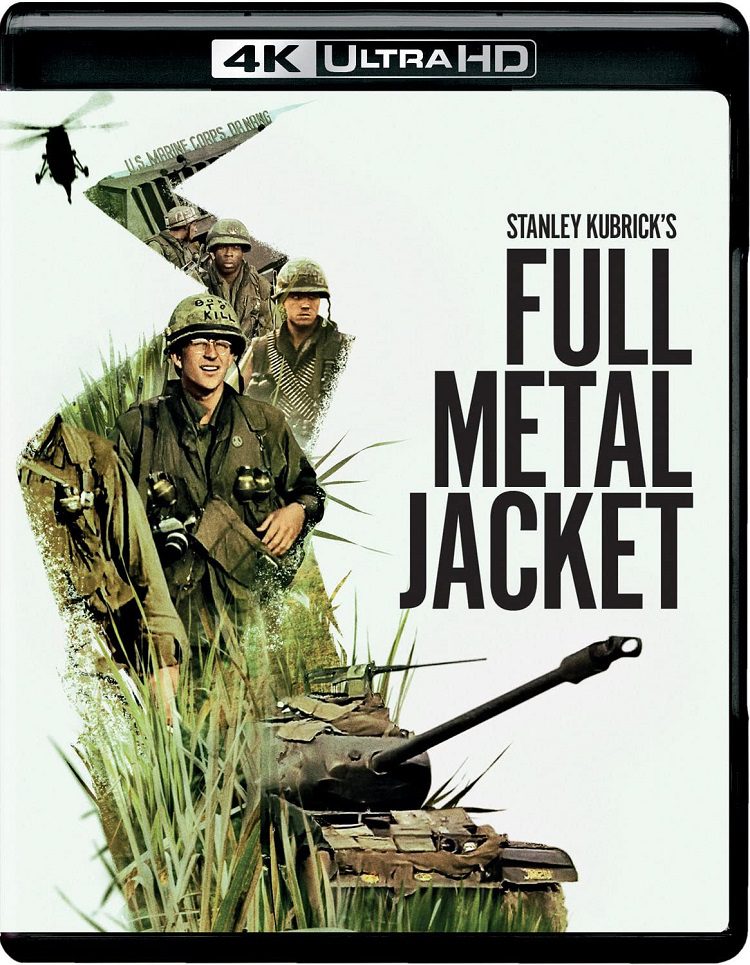
Stanley Kubrick remains one of the greatest directors in the history of cinema. He didn’t make a lot of films, but when he did, he really made them. He had a severely keen visual sense of detail, but he could also be a brute, a perfectionist, cold, and a madman behind the camera. Whether showcasing cowardice during wartime (Paths of Glory), doomsday black comedy (Dr. Strangelove), the complex journey of mankind (2001: A Space Odyssey), or modern ultra-violence (A Clockwork Orange), he always brought his own savage style to any genre. And with his supremely brutal 1987 masterpiece, Full Metal Jacket, he truly captured the bleak madness of war and how it turns even the most unassuming individual into a sheer killing machine.
Told in two parts, the film centers on Private Joker (Matthew Modine), an 18-year-old recruit who goes through boot camp at Parris Island to Hue City in Vietnam as a reporter, and suddenly in the middle of the Tet Offensive. Part one, has him in boot camp, where he encounters three specific characters: Private Cowboy (Arliss Howard), Private Pyle (Vincent D’Onforio, giving a legendary performance), and the super psychotic Gunnery Sergeant Hartman (the late R. Lee Ermey, giving one of the film’s other memorable performances). Pyle, in particular, is an awkward, overweight young man who finds it extraordinarily difficult to adapt to his surroundings, especially the extreme abuse from Hartman. At the end of this first half, Pyle turns lethal, killing Hartman and then blowing his own brains out. Wow!
In Part two, in Vietnam, Joker and his photographer, are sent to the front lines to cover the Tet Offensive, where he is reunited with Cowboy, and meets his squad mates, EightBall (Dorian Harewood), and Animal Mother (Adam Baldwin). While on combat, they all end up lost and come under fire from a sniper, where all hell breaks loose and several of the Marines are killed. At this point, Joker definitely learns the hard way that truly “War is Hell”.
What else can be said about this gut-punch of a film? It’s a film about humanity twisted inside out, innocence lost forever, and a testament to Kubrick’s nihilist filmmaking. A very intense viewing experience indeed.
While the special features (commentary with Baldwin, D’Onforio, Ermey, and critic/screenwriter Jay Cocks; Full Metal Jacket: Between Good and Evil featurette; and theatrical trailer) aren’t anything new, I bet the new 4K transfer will breathe new life to Kubrick’s highly visceral classic, assuming you have a 4K player. Even if you don’t, you still have the Blu-ray disc. So overall, this should be a must-have, especially if you don’t already own any previous releases.
Other releases:
Christ Stopped at Eboli (Criterion): Gian Maria Volonte stars in Francesco Rosi’s 1979 classic as a painter and doctor exiled to a remote region near Eboli, where he learns to enjoy the beauty and wisdom of the city’s peasants, and to rise above his isolation. [Read David Wangberg’s review.]
The Passenger: Michelangelo Antononi’s 1975 masterpiece starring the great Jack Nicholson as a jaded television reporter who assumes the identity of a dead man, who was actually an arms smuggler. He sees this as an opportunity to start a new life. However, he starts to take on the characteristics of his new persona and adapt to his shady involvements, which eventually leads to tragedy
Whiplash (4K UHD): Miles Teller as a promising young drummer who attends a cut-throat music conservatory where his ambitions of greatness are mentored by a vicious jazz band instructor (J.K. Simmons, who won an Academy Award for Best Supporting Actor for the role) who will do absolutely anything to realize his students’ potential.
Babyteeth: A startling coming-of age drama where a seriously ill teenager falls madly in love with a smalltime drug dealer, much to the chagrin of his parents. As her first taste of love brings a newfound zest for life increases, things get complicated and morals disappear. But, she eventually shows everyone how to live like there’s no tomorrow, and they all learn a lesson about finding grace in the mess that is called life. [Read Ram Venkat Srikar’s review.]